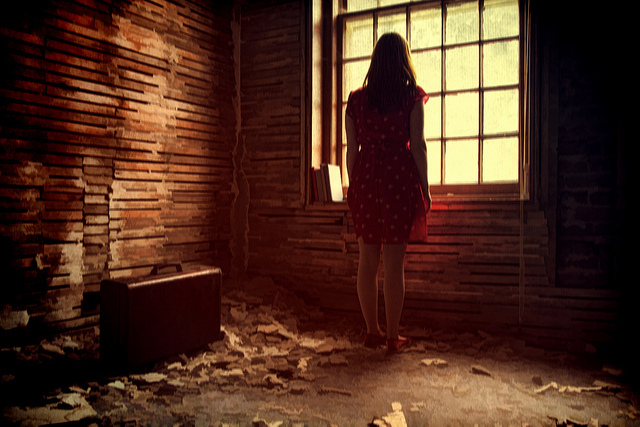
“Sometimes the past should be abandoned, yes. Life is a journey and you can’t carry everything with you. Only the usable baggage.” ~Ha Jin
You’ve probably heard of the fear of missing out but what about the fear of letting go?
My father was volatile and mentally unstable. Criticism was his preferred method of communication. As a child and teenager, I learned to keep my thoughts and feelings locked away and became an expert at deflecting personal questions.
Without realizing it, I carried this habit into adulthood, avoiding any talk about my feelings or turning them into a joke. When a friend finally called me on it, the shock of self-recognition quickly turned to resistance. This is who I am, I thought. Why should I change?
I plodded on, working as hard as ever to keep my fortress intact. It wasn’t making me happy yet I wasn’t ready to change.
As I struggled with my desire to cling to hurtful memories and self-defeating behaviors, it dawned on me that I was afraid to let go because defensiveness was part of my identity.
The problem wasn’t that I had baggage—everyone has baggage—but that it had come to define me. I didn’t know who I would be without it. At that point it hit me: I had to dig deep, discover the person I wanted to be, and then act on it.
After I identified that I was holding on to the past because it seemed too important to jettison, I discovered that letting go is harder than it sounds. Relaxing a long-held belief isn’t a one-day, one-week, or even a one-year process. However, it is possible.
This is the five-step process I discovered:
1. Write an honest list of the thoughts, beliefs, and behaviors that weigh you down.
Grab a pen and notebook, find a quiet space, and spend thirty to forty minutes thinking and writing. It is important to be honest and write down whatever comes to mind. Don’t judge what comes up, just take note.
2. Reflect on each item and identify the source of the thought/belief.
Travel back in time and see where you picked up these items of baggage. Do you fear intimacy because a partner cheated on you? Do you dread holidays because your parents drank too much? Acknowledge the painful memories but don’t wallow in them. Write it down and move on to the next step.
3. Find at least one positive in each hurtful experience/situation.
Look for the silver lining in your cloud. For example, my father’s criticism made me aware of the power of words and taught me the importance of speaking with kindness. Looking for the good in the past helps you reclaim your power. You are no longer a victim; you decide what you take from that experience.
4. Create affirmations to foster change and counteract negative thoughts.
Take the positives from step four and turn them into affirmations or statements of intent, i.e.: “I will speak with love” or “I will treat people with kindness.” This puts the emphasis on positive future behavior and frees you from the past. Make the affirmations tangible: put a reminder on your phone, write them on post-its, or put a list on the fridge.
5. Practice patience and mindfulness.
It takes time to change habits, especially when they are rooted in deep hurts or fears. Check in with yourself regularly using journaling or meditation. If you find yourself shouldering old baggage, be sure to acknowledge it, then gently release it and focus on your affirmations. Replacing negative thoughts with positive actions will help you let go for good.
There are infinite possibilities for each of us, baggage notwithstanding. Everyone has pain. It’s part of what makes us who we are. What defines us, however, is how we handle it. One of my favorite artists, Bruce Springsteen, has some wise words on the subject:
“You can find your identity in the damage that’s been done to you. You find your identity in your wounds, in your scars, in the places where you’ve been beat up and you turn them into a medal. We all wear the things we’ve survived with some honor, but the real honor is in also transcending them.”
By taking the time to identify and understand our baggage and making a conscious decision to let go, we free ourselves to experience life in a richer, deeper, more meaningful way.
Photo by Donnie Nunley
About Cila Warncke
Cila Warncke is a freelance writer and journalist devoted to a life of perpetual discovery. If she’s not playing with words she’s probably running, reading, cooking, doing yoga, cooing at her cats or planning an adventure. Visit her website http://cilawarncke.com and her blog http://irresponsibility.wordpress.com.













 Though I run this site, it is not mine. It's ours. It's not about me. It's about us. Your stories and your wisdom are just as meaningful as mine.
Though I run this site, it is not mine. It's ours. It's not about me. It's about us. Your stories and your wisdom are just as meaningful as mine.
I think we all have baggage that we need to get rid of. I know I do. But it is a process, it doesn’t happen over night. It took me a good year and 6 months to get over baggage from my previous relationship. Once I did that, The Universe blessed me with so many great experience. It is always good to let go of what no longer serves you.
I hear that. I’m almost 9 months into the ‘healing from a previous relationship’, and I’ve learnt so much in that time, but still have a bit more to do before I can reach out and start living again. I’m really looking forward to fully letting go 🙂
I think some things are always with us, which is a blessing when it is love and good memories, and a challenge when it is not-so-good memories. The beauty of facing the big bad scary hurts directly is that we can move it to a conscious level and deal with it proactively instead of being yanked around by our emotions!
Hi…I am into my 4th year trying to digest and come to terms with what happened. 🙁 I hurt, my chest, physically hurts, I carry it with me daily.
Interesting how you mention that being on the defense had become a part of your identity. I wonder about that for me sometimes in my situation. When I finally feel like I have let go and am moving forward, I get right back into the defense when I am put in that situation with a particular person. I wonder if I have let myself become defensive for the sake of holding onto this identity. Interesting read. Thank you.
Thank you for your comment, Mariel. Some people/situations will trigger negative reactions no matter what. I made a decision to not be in contact with my father because that was the only way to not be sucked into old patterns. If a particular person still pushes your buttons it might be a kindness to yourself to stay out of their orbit for as long as you need to, in order to look after yourself. Best wishes 🙂
Maybe that is someone whom you need to be cautious with? Trust your instincts. It’s only an issue if you’re defensive with everyone, including people whom you know can be trusted.
the past allways seems hidden in your mind, it pops up now and again for no apparent reason, some are happy some are sad, and you would love to go back and change the bad, but thats life, i sometimes think that when life is going ok there’s something bad coming. like you have to have good and bad, and fear sometimes that i may get very bad news and hope that never happens, how would i cope with it if it did happen, don’t get me wrong, i don’t think this all the time, but hope things go well for me and my family.
hi cila, this is one of the best posts i have read so far on the internet. your words convey that you are a very wise person. it takes a lot(of focus, understanding, compassion) to see beyond what appears outside. i wonder how much more is needed to see beyond our inner belief and our own character. i think you enjoy your own company a lot(if i can say that here,).. grace to you.. (inner peace..)
Thanks for your kind words Sia. It is a gift to be able to share these thoughts and very touching to know that you’ve found them useful. Blessings.
Thank you for writing this article. I’ve struggling to heal from my past for a long time. Meditating and shamanic journeying has helped me confront and reconcile my past in a safe way but I really haven’t given a lot of thought of who O want to strive to be. I feel like this article is the missing piece. Thank you.
Thank You for sharing your experience & the words of wisdom…:-)
Hi Cila, how does thoughts and beliefs differ from each other? I am guessing that they lead to behaviours but I just tried to make a list of them and in practice it is quite complicated to write down. Something I usually do is to give up when things get a little bit complicated but now I am changing myself and asking for help. Thanks for the great read 🙂
I guess to me ‘ thoughts’ are the chatter of daily life that pops into my head. While ‘beliefs’ are the deep-rooted ideas that frame those thoughts, e.g. someone is critical about my work and I might think, ‘I wish I’d done a better job’ but a belief would be ‘I’m worthless, because I did that badly’. Does that make sense?
That makes perfect sense… Thank you! 🙂
Wonderful post, thank you for sharing your experience and insight that you have learned! I love when you said..”Looking for the good in the past helps you reclaim your power. You are no longer a victim; you decide what you take from that experience.” !!! Also the Brice Springsteen quote/lyric is GREAT! 🙂 This addresses a important lesson to be able to move past our conditioning, and find our own purpose! 🙂
When in doubt, turn to the Boss 😉
I grew up with a father like that and I, too avoid personal questions. I just don’t like sharing things with people too much for fear of being judged. So I just change the topic.
Recently I unintentionally offended someone. It seems to happen to me quite a lot so I have developed a phobia about being very precise and careful about what comes out of my mouth. She came back at me with some seriously crushing opinions on who I was. I felt terrible about it, knowing that once again I’d said the wrong thing, unaware that it would set her off like this. I went back to Buddha’s teachings, and came to the realization that what I give out comes back three-fold, which is why this hurt me so much. So, I wrote to everyone I know, telling them how much I cared about them. I figure that I needed to rather practise at giving out positivity than always being afraid to speak. That I am not the monster I have been made out to be (not that anyone other than my sisters were told about the incident.) Of course, I did apologise to the person whom I’d offended immediately on receiving her rebuff, but it seems that no forgiveness is forthcoming. I am trying to work out if I deserve any. Or if I am truly always going to be unable to move through the world without crashing up against it. However, I do know now that those who care about me really don’t think I am a continual thorn in their sides. This article was really helpful to me in identifying where I am going wrong. Thank you.
Thank you for your comment. Unintentionally hurting someone can be devastating — far worse, sometimes, than being hurt. It takes a great deal of courage and grace to meditate on what’s gone wrong and work through it to grow. By taking positive steps you’ve done what you can. Even if forgiveness isn’t forthcoming from the other party you can forgive yourself and acknowledge your own effort. Blessings.
It’s a powerful thing to consider letting go part of who you are to create peace and happiness. Thank you for sharing your particular journey for letting go. I’m not sure I could articulate my own journey as clearly because it took many years, but I know part of it included changing my perspective from feeling like a victim of circumstance to realizing I could create the life I want.
One of the hardest things, for me, is having patience with the process. I often think “why didn’t I figure this out years ago?!” But we can only be who we are in the moment, and accept it with grace. Best wishes on the journey 🙂
Thanks a lot you
have given this stuff to me you can’t even imagine that how important it is
for me.
im glad i find this website .thank you
Hi Cila,
This is a great post. Sometimes it is hard for people to pinpoint what weighs them down for #1. Once they can overcome admitting to themselves what that is, the other steps will be a lot simpler. Overall, great advice. #5 made me think of this quote:
Patience is bitter, but its fruit is sweet.- Jean-Jacques Rousseau
Keep up the great posts!
Megan
Life’s Baggage. Everyone has it, it’s how we carry it that defines us.
I agree with the given methods of healing. These are the first steps I provide to my clients during counseling. It indeed works out well.